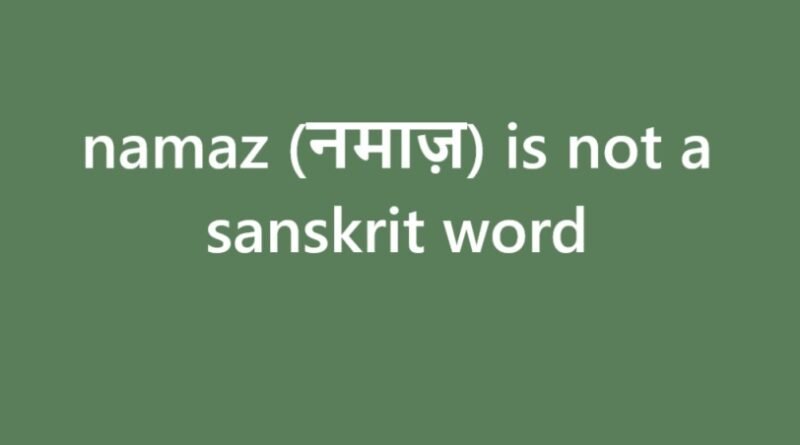Namaz (नमाज़) is Not a Sanskrit Word
Understanding the Correct Sanskrit Formation: “Namah + Aj = Namo’jaya”
In Sanskrit, words combine through grammatical rules known as Sandhi (joining of sounds). The phrase “Namah + Aj” follows Visarga Sandhi rules. Let us analyze why the correct Sanskrit formation is “Namo’jaya” and why “Namaz” (नमाज़) is incorrect.
Breaking Down the Components:
- Namah (नमः): This is a Sanskrit word meaning “salutation, bowing, or obeisance.” It is commonly found in phrases like “Namah Shivaya” (I bow to Shiva).
- Aj (अज): This is a Sanskrit term meaning “unborn,” often referring to an eternal being, such as Brahman, Vishnu, or Shiva.
Application of Visarga Sandhi:
When “Namah” (नमः) is followed by a vowel like “A” (अ) from “Aj” (अज), the Visarga (:) undergoes transformation:
- नमः + अज → नमोऽजाय (Namo’jaya)
- The Visarga (ः) changes to ‘ओ’ and combines with अज to form नमोऽजाय
Thus, the grammatically and etymologically correct word in Sanskrit is “Namo’jaya”, meaning “Salutations to Aj (the Unborn)”.
Why “Namaz” (नमाज़) is Incorrect:
- The Letter “ज़” (Za) is Not Sanskrit: The character “ज़” (Za) does not exist in traditional Sanskrit phonetics. Sanskrit has dental and cerebral sounds but lacks the “Z” sound found in Persian and Arabic.
- “Namaz” is of Persian-Arabic Origin: The word “Namaz” (نَماز) is a Persian term derived from the Middle Persian “namāz” (prayer), which itself has Iranian linguistic roots, not Sanskrit ones.
- Sanskrit Grammar Does Not Support “Namaz”: The natural phonetic and grammatical transformations of Sanskrit do not lead to “Namaz.” The formation “Namah + Aj” never phonetically evolves into “Namaz”.
Conclusion: “Namaz” is Not a Sanskrit Word
Based on linguistic analysis and Sanskrit grammar, “Namah + Aj = Namaz” is an incorrect derivation. The correct Sanskrit transformation is “Namo’jaya”, and the word “Namaz” comes from Persian-Arabic, not Sanskrit. Furthermore, the letter “ज़” does not exist in classical Sanskrit, confirming that “Namaz” is not of Sanskrit origin.
Unity is the essence of humanity, transcending all differences. God is one, and people across the world, regardless of language or tradition, pray to the same divine presence in their own ways. True devotion lies in love, respect, and harmony among all.

